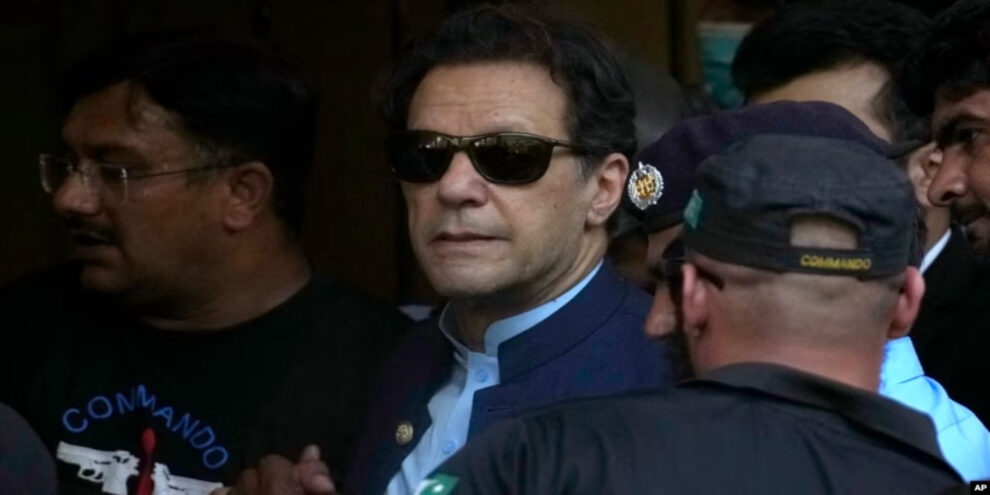ISLAMABAD — Jailed former Prime Minister Imran Khan has alleged that he is being prosecuted on “bogus” charges of exposing state secrets to protect Pakistan’s former military chief and a U.S. diplomat.
Khan’s family on Thursday released what is believed to be his first formal statement since he was convicted of graft and sentenced to three years in prison on August 5.
The statement, posted on Khan’s X account (formerly Twitter), comes ahead of his expected indictment on the state secrets charge next week. The closed-door hearing is being conducted inside prison under the Official Secrets Act.
Khan is alleged to have leaked the contents of a classified diplomatic cable, internally known as a cipher, to the public for political gain.
“As far as the Cipher case is concerned, this bogus case is designed to protect former Army Chief General Bajwa and Donald Lu,” the 70-year-old former Pakistani leader said in the X statement. He was referring to retired General Qamar Javed Bajwa, as well as Lu, the U.S. assistant secretary of state for the Bureau of South and Central Asian Affairs.
“I was the elected Prime Minister of the country. Treason was committed against me and my govt by General Bajwa, instead of investigating the foreign conspiracy in orchestrating a regime change, a case has been filed against me for informing the people of Pakistan, the natural protectors of this country, about this treason,” he said.
The cricket star-turned-politician has been in a political showdown with the country’s powerful military since a parliamentary no-confidence motion toppled his government in April 2022.
The cipher, written by then-Pakistani ambassador to Washington Asad Majeed Khan, purportedly quoted Lu as asking the diplomat to tell his military leadership they should remove Imran Khan through a no-confidence motion because of his government’s neutrality over the war in Ukraine. Khan was in Moscow on the day that Russia launched its full-scale invasion.
There has been no comment from Lu, but the State Department, while commenting on the reported cipher content, said in August that Washington had objected to Khan’s visit to Russia, but it played no role in his removal from power.
“So without stipulating whether it’s an accurate comment or not, if you take all of the comments in context that were reported in that purported cable, I think what they show is the United States government expressing concern about the policy choices that the prime minister was taking,” said spokesman Mathew Miller. “It is not in any way the United States government expressing a preference on who the leadership of Pakistan ought to be.”
A U.S. news outlet, The Intercept, published the purported text of the cipher for the first time in August.
The deposed prime minister maintains that the cipher proves that Washington plotted his removal in collaboration with then-army chief Bajwa. Washington and the Pakistani military have denied the allegations.
Khan’s conviction has already barred him from contesting an election under local laws, and he could be sentenced to 14 years in the cipher case if found guilty. He has challenged his conviction and the cipher charge in higher courts. Shah Mahmood Qureshi, former Pakistani foreign minister and current acting head of Khan’s party, is also in custody and being tried in the cipher case.
On Thursday, Khan gave credence to media reports that he was being pressured in custody to quit politics and leave Pakistan in exchange for quashing a slew of lawsuits he says are designed by the military to keep him from returning to power in subsequent elections.
“Today, I am stronger and fitter; spiritually, mentally and physically, than ever before. … To those suggesting that I leave the country, know that I will live and die with Pakistan, and I will not leave my land to go anywhere,” he said on his account.
Source : VOA News















